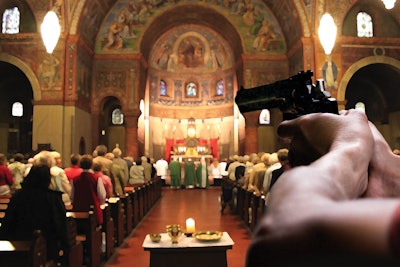 Law enforcement agencies nationwide have started working with houses of worship to help them present themselves as less inviting to the bad guys.Photo Illustration: Kevin Haegele, POLICE Art Director
Law enforcement agencies nationwide have started working with houses of worship to help them present themselves as less inviting to the bad guys.Photo Illustration: Kevin Haegele, POLICE Art Director
In recent years, houses of worship have become targets for active shooter attacks. This presents some institutions of faith with a thorny dilemma. They are supposed to be places of peace and sanctuary, open to all who seek, but now they must consider taking measures to protect the faithful that would have been unthinkable in the past.
Houses of worship have become targets for a variety of reasons. In the case of the Sutherland Springs (TX) Baptist Church, it's believed the shooter was acting out a personal grudge against an ex-wife and her family. In the cases of the Emanuel AME Zion Church in Charleston, SC; the Tree of Life synagogue in Pittsburgh; and the Sikh Temple in Oak Creek, WI, the shooters were acting out of hatred toward the faith or the ethnicity of the people who were inside the building.
Regardless of the shooter's motivations, their targets all had one thing in common: they were easy. That has led a number of police agencies nationwide to start working with houses of worship to help them present themselves as less inviting to the bad guys.
Bill Harvey, retired chief of the Ephrata (PA) Police Department and a veteran Savannah, GA, officer, has been speaking with a variety of faith groups and individual congregations for about four years. His advice boils down to three basic categories of information: prevention, preparation, and response.
Prevention
One of the biggest debates in the faith community is what level of security is appropriate for a house of worship. Some lock their doors at a certain time before each service. Others say that locking the doors is counter to their mission of being open to all.
Harvey believes that even if a house of worship chooses to remain unlocked during services that there are steps that can be taken to bolster security. These of course include security systems, visible signage, and visible cameras, all of which can make a target look harder. But Harvey also recommends the human touch. For example, in a Christian church he advises that one or more ushers occasionally check the perimeter.
Having somebody do a 360-degree walk around the property every once in a while during the service can alert the worshippers to a threat. It can also help congregants who may be in need. "You can make sure Ms. Emma hasn't fallen and is out in the parking lot crying for help," Harvey says.
Another element of prevention is knowing who is coming to the building at times other than services. Harvey says he's seen churches, in particular, rent out rooms for Alcoholics Anonymous, Narcotics Anonymous, and gang rehabilitation meetings. That can be good for the church's bottom line and also for the worthy groups involved, but churches need to know who is coming to these meetings and what they are doing inside the building. It's not outside the realm of possibility that active shooters or burglars could be using these programs to gain access and case the building.
To that same point, security experts recommend that houses of worship practice key control. That means making sure that people with keys really need the access and knowing who has the keys. Also, it's important to make sure that anyone who leaves the congregation returns the keys. If not, new locks may be warranted.
Preparation
Harvey says houses of worship need to develop plans for how emergencies—including active attacks—will be handled. It's important to have "but what if then thinking," he says. That means the unexpected can happen and one plan is not enough. "You have to have secondary and tertiary plans on what to do," he explains, adding that such plans are not just about what to do in the unlikely event of an active shooter attack. "This planning can also be used for medical events during services," Harvey says.
Perhaps the most important emergency planning that the leaders of any house of worship can do is to know the people in their congregation. Identify the people with lifesaving skills, including doctors, nurses, EMTs, police officers, and firefighters.
Harvey recommends that houses of worship arrange training for the congregation on things like first-aid and emergency medical response. "It's more likely that you will have a medical event than any other emergency. Classes like CPR and Stop the Bleed are great team builders for volunteers and families love doing them together."
Another way that houses of worship can prepare for what Harvey calls the "ultimate dark sky day" is to coordinate with local public safety agencies. "Have the police department and the fire department come out and do walkarounds. Let them know where the cutoffs are for the electrical. Also, they need to know where the children will be, in case of an incident. And they need to know where disabled people who might need rescue assist might be."
Response
The first topic that always comes up in any discussion of active shooter response in houses of worship is one of firearms and armed congregants. Preparing for armed response to church attacks is a major debate in the faith community. Some congregations are all for it, but some refuse to even consider having a potential deadly force response to an attack. "They say they don't want to do it. If someone comes in and starts shooting, they feel that is God's will."
Many congregations have active law enforcement officers as members. So they have trained armed professionals in the building who can respond to an attack. Others do not have those professionals and Harvey says that can be a problem.
When a house of worship chooses to have armed congregants or hired guards, the most important concern is training, according to Harvey. "The biggest vulnerability in this situation could be untrained and unvetted volunteers," he explains. "Just because a congregant has a CCW, does not mean that person knows what to do in a close-quarters scenario where there are collateral innocents standing around."
In his presentations to Ephrata's houses of worship, the former chief says he and the town's other officers were always straightforward on the issue of firearms. "We brought it up and we did an overview and explained to them the pros and cons," Harvey says. One thing he stressed is that successfully responding to an active shooter with deadly force requires a group effort. While the armed congregant engages the shooter, other members of the team need to get the innocents to safety. "The congregants who are going to make this response need to train as a team and everybody needs to learn their roles," he says.
Of course, the best response to any active shooter at a house of worship will be local law enforcement. Some congregations now have alarms that can alert police. Some even have cameras that can stream live video to first responders in the event of an emergency.
David Griffith is the editor of POLICE/PoliceMag.com.


















